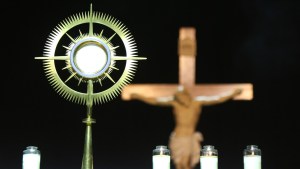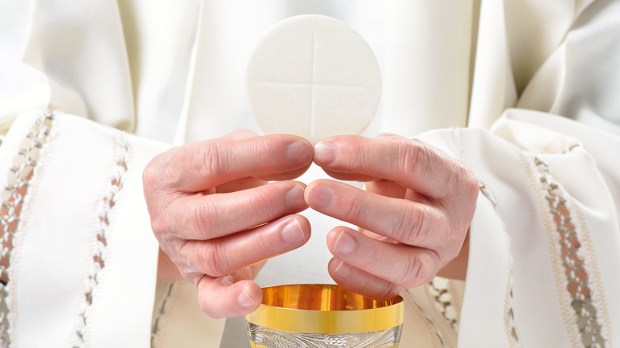Lenten Campaign 2025
This content is free of charge, as are all our articles.
Support us with a donation that is tax-deductible and enable us to continue to reach millions of readers.
Jesus said to the crowds: “I am the living bread that came down from heaven; whoever eats this bread will live forever; and the bread that I will give is my flesh for the life of the world.”The Jews quarreled among themselves, saying, “How can this man give us his flesh to eat?”—John 6:51-52
Questions are an essential part of who we are. In fact, for contemporary theologians like Karl Rahner questions are both an essential part of our humanity, as well as our faith, because questions help lead us to the truth.
This has been a week of questions for Catholics in the United States. Our questions are important and will, we trust, help lead us to truth and, in the end, healing for victims and for the Church herself.
These questions have certainly been in my mind and as I reflected on the Gospel for this Sunday and prepared to write this reflection. I found myself sympathizing with the questioning, quarrelling crowd. After all, their questions reveal how they were trying to get to the truth of what Jesus was saying to them!
The Church’s teachings about the Eucharist—Christ’s Real Presence in the bread and wine consecrated in the Mass—is a fundamental Christian belief. And yet, theologians and saints have struggled for centuries to explain the how of this sacrament. Technical words (like transubstantiation) and poetic images (such as “Bread of Angels” and “Holy Victim”)can help us enter into the mystery of the Eucharist, but theological reasoning can only take us so far.
The Gospel we hear proclaimed on this Sunday breaks open the mystery of the Eucharist and Jesus’ words remind us that there is much more at stake than points of theology. He offers us a promise: “Whoever eats my flesh and drinks my blood remains in me and I in him.”
In those few words we discover the great gift that is at the heart of what we believe about the Eucharist: Jesus is giving us all of himself. And Jesus’ gift of himself is also an invitation for us to give ourselves to him. This relationship is the real meaning of “holy communion.”
And so, while the how of the Eucharist is an important and difficult question, is it really the right question?
By changing our focus from the how to the who and why of the Eucharist, we quickly realize that Christ’s Presence in the Eucharist isn’t a theological problem to be solved but a mystery to be lived.
Some years ago, Pope Benedict XVI reflected, “Christianity is not a new philosophy or a new morality. We are Christians if we encounter Christ.”
We are Christians because we have a special relationship—a communion—with Jesus that inspires us to follow him and live as he did.
But the who of the Eucharist isn’t only Jesus who is truly present in the sacrament. The who also includes all those in the Church who celebrate and receive the Eucharist. And this leads us to the why of the Eucharist: As we receive Jesus in the Eucharist, we renew our communion with him and with Christians of every time and place. And in the Eucharist we are given the strength to be like Jesus by giving ourselves to others so that, together, we may all share in the eternal life that he has promised us (cf. John 6:57-58).
When do you let the questions overshadow your faith? How does the Eucharist nourish and enrich your life, especially in times of doubt and uncertainty? In what ways can you share the gift of life you receive in the Eucharist with those in need?
Words of Wisdom: “The heart fills with trust and hope by pondering on Jesus’ words recounted in the Gospel: ‘He who eats my flesh and drinks my blood has eternal life, and I will raise him up at the last day’ (John 6:54). Let us live the Eucharist with the spirit of faith, of prayer, of forgiveness, of repentance, of communal joy, of concern for the needy and for the needs of so many brothers and sisters, in the certainty that the Lord will fulfill what he has promised us: eternal life. So be it!”—Pope Francis

Read more:
How I began to believe that the Eucharist really is Jesus

